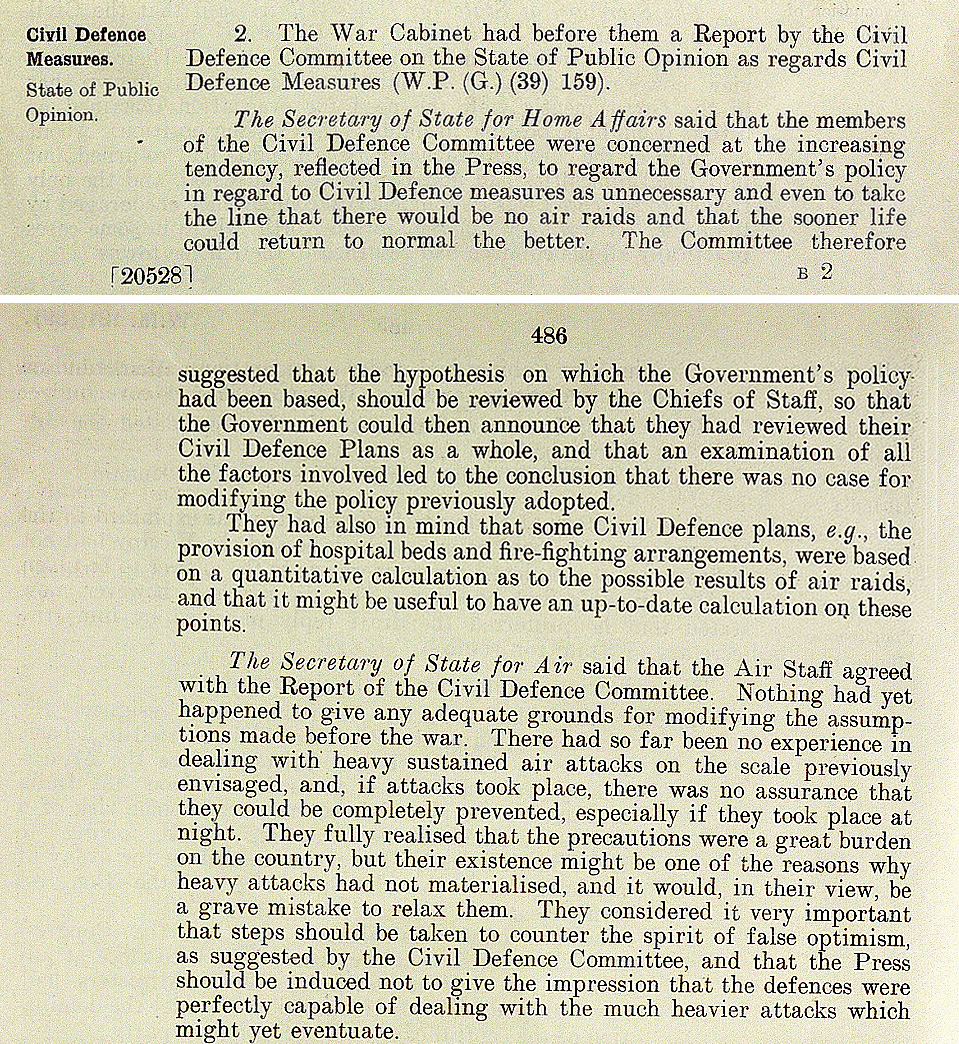
Extract from War Cabinet Minutes concerning civil defence, November 1939, Catalogue ref: CAB 65/2
By 1935, British officials were discussing air raid precautions. Little was done, though, until the crisis of 1938, when many European countries were alarmed by Germany’s behaviour towards Czechoslovakia. In Britain there was panic as people were afraid of bombing attacks. Evacuation plans were hastily announced; anti-aircraft guns were set up; and deep trenches were dug in London parks to serve as air raid shelters. The crisis ended after talks in Munich but it had shown that British civil defence was weak. One result of the crisis was the fast development of air raid precautions (A.R.P.) under the leadership of Sir John Anderson. Spending on A.R.P. rose from £9.5 million in 1937-38 to £51 million in 1939-40.
Transcript
Civil Defence Measures.
State of Public Opinion.
2. The War Cabinet had before them a Report by the Civil Defence Committee on the State of Public Opinion as regards Civil Defence Measures (W.P. (G.) (39) 159).
The Secretary of State for Home Affairs said that the members of the Civil Defence Committee were concerned at the increasing tendency, reflected in the Press, to regard the Government’s policy in regard to Civil Defence measures as unnecessary and even to take the line that there would be no air raids and that the sooner life could return to normal the better. The Committee therefore suggested that the hypothesis on which the Government’s policy had been based, should be reviewed by the Chiefs of Staff, so that the Government could then announce that they had reviewed their Civil Defence Plans as a whole, and that an examination of all the factors involved led to the conclusion that there was no case for modifying the policy previously adopted.
They had also in mind that some Civil Defence plans, e.g., the provision of hospital beds and fire-fighting arrangements, were based on a quantitative calculation as to the possible results of air raids, and that it might be useful to have an up-to-date calculation on these points.
The Secretary of State for Air said that the Air Staff agreed with the Report of the Civil Defence Committee. Nothing had yet happened to give any adequate grounds for modifying the assumptions made before the war. There had so far been no experience in dealing with heavy sustained air attacks on the scale previously envisaged, and, if attacks took place, there was no assurance that they could be completely prevented, especially if they took place at night. They fully realised that the precautions were a great burden on the country, but their existence might be one of the reasons why heavy attacks had not materialised, and it would, in their view, be a grave mistake to relax them. They considered it very important that steps should be taken to counter the spirit of false optimism, as suggested by the Civil Defence Committee, and that the Press should be induced not to give the impression that the defences were perfectly capable of dealing with the much heavier attacks which might yet eventuate.
